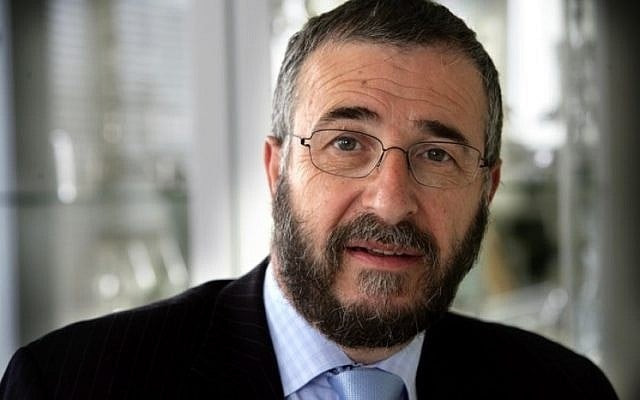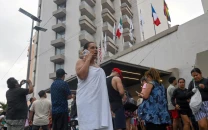Dutch Rabbi to leave centrist party over leader's 'Muslim exclusion'
For many Dutch Jews, anti-Semitism has become a hobby, says van de Kamp

Rabbi Lody van de Kamp. PHOTO: JTA
Lody van de Kamp, a left-leaning activist for Jewish-Muslim dialogue, expressed his intention to leave the Christian-Democratic Appeal (CDA) while giving an interview to the Het Parool daily.
Earlier that day, the CDA had inked a power-sharing deal with three other coalition partners on the formation of a cabinet which would work towards making illegal immigrants leave the country.
Award-winning authors take on Israeli occupation
The deal in the Netherlands, which is one of Israel’s staunchest allies in Western Europe, also mentioned for the first time in such a document about the need to create an ‘independent’ Palestinian state.
“Suddenly we’re talking about our ‘Judeo-Christian society’,” said van de Kamp, referring to a speech that CDA leader Sybrand Buma last month delivered at a school. “It obscures a hidden thought, that we don’t want the Muslims here, and that makes me uncomfortable,” van de Kamp said.
A leftwing outlier of CDA, van de Kamp angered many Jews and non-Jews in 2015, when he partially dismissed some apprehensions over the increasing hatred of Jews in the Netherlands, saying “for many Dutch Jews, anti-Semitism has become a hobby.”
In the speech at school, party chief Buma spoke about his party’s will to stand up for “ordinary Dutchmen” suffering from the impact of immigration. He was criticised by other important members of his party for the speech and his insistence on a tougher stance in the coalition agreement against illegal immigration and criminal activity that many link with Muslim immigrants.
Earlier this month, a former justice minister, Hirsch Ballin, whose father was a Jewish survivor of the Holocaust wrote, along with another prominent CDA member, wrote a letter criticising Buma, accusing him of “abandoning refugees” and offending Dutch Muslims.
Buma, on Wednesday, stated he was ‘proud’ of the coalition agreement his party co-signed. This signifies a rightward shift from the previous agreement, which Dutch Labour in 2012 co-signed with the centrist People’s Party for Freedom and Democracy of Prime Minister Mark Rutte.
The content of the 2012 document was concerned with the rising number of refugees assimilated in the Netherlands without mentioning illegal immigration. However, the 2017 agreement does not mention increasing absorption quotas, emphasising there will be “countermeasures to irregular immigration” and that “whoever is not allowed to stay must soon leave.”
The agreement also included a reference to anti-Semitism, not present in the previous accord and a new declaration, that many observers consider to be connected to radicalisation.
“Freedom of opinion is no free pass for inciting hatred and radicalisation,” the text reads.
“Our society has no place for hatred of homosexuals, anti-Semitism, hatred of Muslims, genital mutilation, child marriages, forced marriages, incitement of hatred and violence against people for their opinions of against minors,” further states the agreement.
In its foreign relations policy, the Netherlands will endorse universal rights “especially of vulnerable groups like LGBT communities and Christians,” the agreement states.
Israelis rally for Palestinian state, end of occupation
In addition to Rutte’s party and the CDA — two parties containing staunch supporters of Israel — the coalition’s other partners are the pro-Zionist Christian Union party and the left-leaning D66 party. In its election for the 2016 elections, D66 said regarding Israel that it supports the two-state solution but urged the Dutch government to recognise a Palestinian state regardless of an agreement.
It also suggested that the Netherlands should “apply measures against Israel’s settlement policy” in the statement, which did not include a proposal for similar measures against Palestinian actions considered damaging for peace.
Similar to the 2012 agreement, the Palestinian-Israeli issue was the only international conflict specified in the 2017 document. Israel was first mentioned in the coalition agreement in 2007, in a passage about a potential peace process for the establishment of a ‘sustainable’ Palestinian state.
However, unlike the earlier deal, which merely suggested contributing to peace and security while maintaining good relations with both parties, the agreement revealed this week extends support for Palestinian statehood under the two-state solution for an “independent, democratic and viable Palestinian state alongside a secure and internationally-recognised Israel.”
This story originally appeared in the Times of Israel.



















COMMENTS
Comments are moderated and generally will be posted if they are on-topic and not abusive.
For more information, please see our Comments FAQ